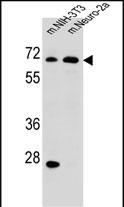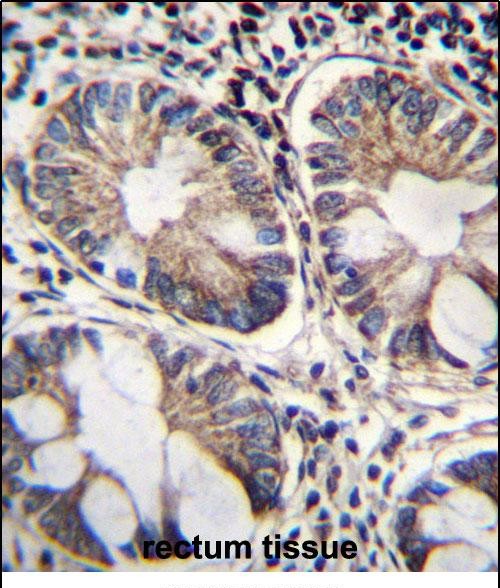

| WB | 1/1000 | Human,Mouse,Rat |
| IF | 咨询技术 | Human,Mouse,Rat |
| IHC | 1/100-1/500 | Human,Mouse,Rat |
| ICC | 技术咨询 | Human,Mouse,Rat |
| FCM | 咨询技术 | Human,Mouse,Rat |
| Elisa | 咨询技术 | Human,Mouse,Rat |
| Aliases | NAD-dependent malic enzyme, mitochondrial, NAD-ME, Malic enzyme 2, ME2 |
| Entrez GeneID | 4200 |
| WB Predicted band size | 65.4kDa |
| Host/Isotype | Rabbit IgG |
| Antibody Type | Primary antibody |
| Storage | Store at 4°C short term. Aliquot and store at -20°C long term. Avoid freeze/thaw cycles. |
| Species Reactivity | Human, Mouse |
| Immunogen | This ME2 antibody is generated from rabbits immunized with a KLH conjugated synthetic peptide between 527-556 amino acids from the C-terminal region of human ME2. |
| Formulation | Purified antibody in PBS with 0.05% sodium azide. |
+ +
ME2 (Malic Enzyme 2) is a mitochondrial enzyme that catalyzes the oxidative decarboxylation of malate to pyruvate, linking glycolysis and the tricarboxylic acid (TCA) cycle. It plays a critical role in cellular energy metabolism by generating NADH and ATP, while also supplying precursors for lipid and amino acid biosynthesis. ME2 is implicated in various physiological and pathological processes, including cancer progression, metabolic disorders, and oxidative stress responses. In cancer biology, ME2 overexpression has been associated with enhanced tumor cell proliferation, invasion, and chemoresistance, making it a potential therapeutic target.
ME2 antibodies are essential tools for studying its expression, localization, and function in both normal and diseased tissues. These antibodies are widely used in techniques like Western blotting, immunohistochemistry (IHC), and immunofluorescence (IF) to assess ME2 levels in clinical samples or experimental models. Researchers also employ ME2 antibodies to investigate its regulatory mechanisms, such as interactions with oncogenic signaling pathways or metabolic reprogramming in tumors. Additionally, ME2-targeted therapies, including small-molecule inhibitors or antibody-based approaches, are under exploration for cancer treatment. The development and validation of high-specificity ME2 antibodies remain crucial for advancing diagnostic and therapeutic strategies in diseases linked to ME2 dysregulation.
×